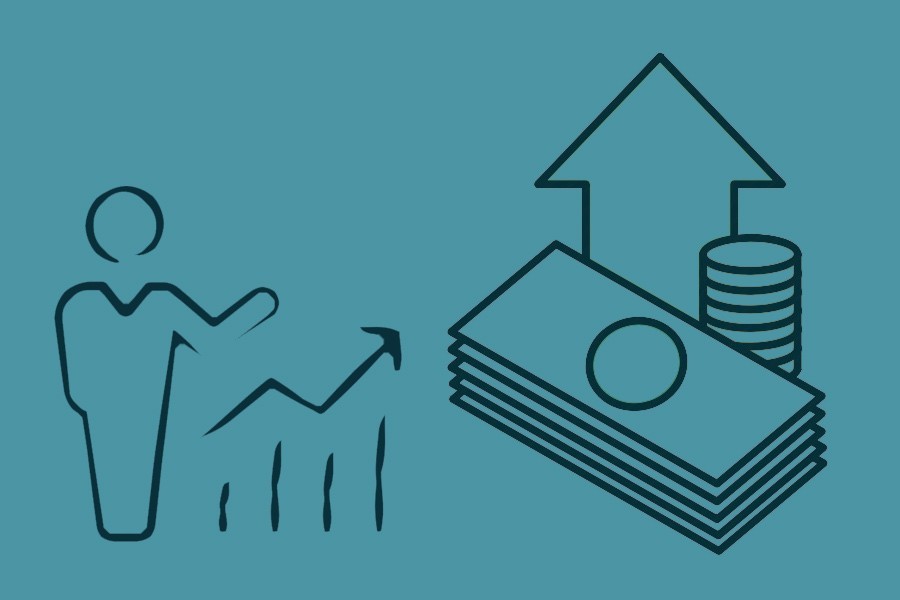Economy in difficult-to-break vicious cycle
High interest, weak investment to blame: Experts

Published :
Updated :

Bangladesh's economy is trapped in a difficult-to-break vicious cycle of high interest rates, persistent inflation, weak investment, and slowing gross domestic product (GDP) growth, making it increasingly challenging to revive private-sector activities, experts say.
They note that the financial sector is passing its toughest phase with non-performing loans (NPLs) rising to 35.7 per cent of the total loans - intensifying liquidity pressures, crowding out the private sector with elevated interest rates, and heightening inflation risks.
The observations were shared at an event organised by the Policy Research Institute (PRI) of Bangladesh on Thursday.
The programme was arranged at the PRI office in the capital to launch the October issue of the Monthly Macroeconomic Insights (MMI), published under PRI's Centre for Macroeconomic Analysis (CMEA). Anwar-ul-Alam Chowdhury, president of the Bangladesh Chamber of Industries (BCI), attended the event as the chief guest, while former National Board of Revenue (NBR) chairman Dr Nasiruddin Ahmed and North South University Professor Dr AKM Atiqur Rahman spoke, among others.
The event was moderated by PRI Chairman Dr Zaidi Sattar and featured a keynote by Dr Ashikur Rahman, principal economist at PRI, on the macroeconomic position of the country, with a focus on irregularities and mismanagement in the banking system.
Dr Zaidi urged policymakers to examine how other countries responded to the 1997 Asian financial crisis and the 2008-09 global financial crisis to identify practical policy options for addressing Bangladesh's current macroeconomic stress.
"Internally, we face a low tax-to-GDP ratio, limited public spending, persistently high inflation, and rising poverty and inequality. Growth today is neither inclusive nor job-creating, and it has little impact on poverty reduction," he said.
He also said foreign investment had not picked up, domestic investment remained stagnant, and jobs were not being created at the pace the economy needed.
BCI President Anwar-ul-Alam warned that the country's private sector was under severe stress, describing the economy as "bleeding".
However, the interim government did not care about the business community, he said, terming the situation "very unfortunate".
"Industries, particularly manufacturing, are struggling with high inflation, rising interest rates, energy crisis, and sharply increased production costs, which have cut output by 30-40 per cent. Power generation has dropped by 42-45 per cent, intensifying the crisis," he said.
The low annual development programme (ADP) implementation - just 8.33 per cent in four months of FY26 - had hampered sectors like steel, cement, and bricks, which relied on construction and infrastructure demand, he also said.
"Demand is weak, capital is not flowing, and businesses are struggling," he said, adding that rising NPLs, driven largely by higher energy costs, were worsening the situation.
"Energy prices have increased, but supply has not kept pace. Commitments on energy, logistics, and interest rates have not been met. Yet, the government's response has been minimal," he said.
He also highlighted the plight of small and cottage industries, noting that nearly half in Dhaka had shut down, displacing workers.
The financial sector was facing its toughest phase in modern Bangladesh, with Tk 6.4 trillion NPLs exceeding 35 per cent of the total banking sector loans and distressed assets projected to reach Tk 9.5 trillion, accounting for over 60 per cent of the total loans, said PRI Principal Economist Dr Ashikur.
"With more than Tk 6.0 trillion in NPLs in the banks' balance sheets, interest rates cannot be expected to fall. Lending and deposit rates are likely to diverge, as banks cannot sustain lower rates amid such high NPLs," he said in his keynote. He warned that banks would remain under continuous liquidity pressure. Any government with such NPLs would inevitably be under pressure to resort to money printing, he said.
Without addressing the NPL problem, a high-interest, high-inflation economy would continue to depress investment, he also said. He said the economy continued to face elevated inflation alongside deep-seated problems in the banking sector.
The policy response - raising the policy rate and aggressively tightening liquidity - had helped bring inflation down to a 39-month low, he noted.
Even then, inflation could pick up again in the coming months as public expenditure rose, consumer spending strengthened, and possible supply-chain disruptions emerged, he warned.
Former NBR chairman Dr Nasiruddin argued that tax policy should be formulated by politicians and the business community rather than bureaucrats, some of whom he believed to have contributed to the problem.
He also highlighted employment and the lack of quality, job-oriented education as major national concerns that the next government must address. North South University Professor Dr Atiqur noted that without the July mass uprising, the true scale of rising NPLs would have remained hidden, raising doubts about the economy's ability to sustain itself.
He emphasised the urgent need for export diversification beyond readymade garment, warning that the potential Trump-era tariffs and a real effective exchange rate (REER) above 6 per cent were already weakening competitiveness.
jahid.rn@gmail.com


 For all latest news, follow The Financial Express Google News channel.
For all latest news, follow The Financial Express Google News channel.